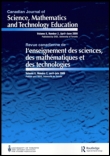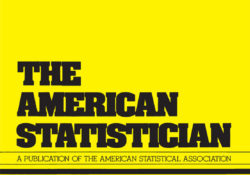eric.ed.gov har udgivet: It is inevitable to receive technology support for teacher training activities in this new era in which technology is at large in our lives. Sufficiency in terms of TPACK (Technology, Pedagogy and Content Knowledge) is among the basic conditions for being qualified teachers. For this reason, activities for teacher candidates’ TPACK development should be involved in teacher training activities. TPACK expresses a combined knowledge, so complex activities should be consulted to increase this accumulation of knowledge. In this direction, the process of designing instructional materials allows learning by design and can address all of this integrated knowledge. In this study, in math education department of a state university in Turkey, a research was conducted with 19 teacher candidates studying in the third grade. Teacher candidates have been… Continue Reading →
Like this:
Like Loading...
eric.ed.gov har udgivet: This study explored the effect of conventional laboratory practical manuals on pre-service teachers’ integrated science process skills (ISPS). A validated multiple-choice questionnaire with the ISPS components was used to collect data. No significant difference between pre-service subject-specific teachers’ (biology, physics and chemistry) ISPS scores was found. The ISPS scores significantly increased along with proliferation in lab practical works, except for physics. Pre-service math teachers, who had no lab practical works, showed significantly higher ISPS scores than pre-service science teachers. The results indicated that all pre-service teachers’ ISPS scores fell into intermediate level. Further, it was found that they possessed the lowest scores for such ISPS as identifying and controlling variable, stating operational definition and designing experiments. The common format of the conventional laboratory manual adopted from many… Continue Reading →
Like this:
Like Loading...
tandfonline.com har udgivet en rapport under søgningen “Teacher Education Mathematics”: Abstract Formulae display:?Mathematical formulae have been encoded as MathML and are displayed in this HTML version using MathJax in order to improve their display. Uncheck the box to turn MathJax off. This feature requires Javascript. Click on a formula to zoom. Abstract The annual National Assessment Program—Literacy and Numeracy (NAPLAN) measures the literacy and numeracy skills of primary and secondary students in Australia. Under the three Smarter Schools National Partnership, additional funding is provided to the independent schools with the expectation of improving student performance. Using multilevel modelling to account for within-school variables and demographics, we analyse NAPLAN data from the 2008–2011 tests for a sample of independent schools to estimate the effect of the National Partnerships on student performance.… Continue Reading →
Like this:
Like Loading...
eric.ed.gov har udgivet: The “Building Blocks PreK Math Curriculum” (Clements & Sarama, 2007) was designed to facilitate children’s engagement in math and talk about math. Much research investigates the effect of curriculum on classrooms or teacher practices. This study used a mediational model to look at a curriculum’s effect on children’s achievement gain, operating through specific child behaviors in the classroom. Specifically, this study looked at how a math curriculum affected children’s focus in math alone or in all learning activities (math, literacy, science, social-studies, and other), talking during math-related activities or in all learning activities, and engagement during math or during all learning activities. Additionally, this study examined how those child behaviors predicted children’s math achievement gain. It is hypothesized in the existing literature that much of the variability… Continue Reading →
Like this:
Like Loading...
eric.ed.gov har udgivet: Purpose: The purpose of this research was to determine the effect of interactive whiteboard technology on the math curriculum in a single school district. Methodology: Six second grade teachers tracked their technology use during math instruction to be compared with student performance on a common assessment at the conclusion a counting money unit and qualitative grade data collected by the teacher. Results: The results indicate that interactive technology use during instruction is not having a positive effect on student learning. Conclusions: How interactive whiteboard technology is being used during instruction is more important than how often interactive whiteboard technology is being used. If the technology is only being used to create perfect visuals it is not being used to its full potential Recommendations: In order for schools… Continue Reading →
Like this:
Like Loading...
tandfonline.com har udgivet en rapport under søgningen “Teacher Education Mathematics”: Abstract Abstract Science education research has built a strong body of work on students’ understandings but largely overlooked the nature of science knowledge itself. Legitimation Code Theory (LCT), a rapidly growing approach to education, offers a way of analyzing the organizing principles of knowledge practices and their effects on science education. This article focuses on one specific concept from LCT—semantic gravity—that conceptualizes differences in context dependence. The article uses this concept to qualitatively analyze tertiary student responses to a thermal physics question. One result, that legitimate answers must reside within a specific range of context dependence, illustrates how a focus on the organizing principles of knowledge offers a way forward for science education. Résumé La recherche en enseignement des sciences… Continue Reading →
Like this:
Like Loading...
eric.ed.gov har udgivet: As education continues to progress schools are constantly seeking innovative ways to cultivate and enhance achievement for all students. As a result many public schools are pushing toward the inclusion model. This model includes co-taught instruction to meet the many needs of special education students. This research study was implemented to investigate the comparative effects of co-teaching versus solo-teaching on student’s math achievement in elementary school. Study participants included two fourth grade classes in an elementary school, one with a regular education (solo-teaching) and the other with the same regular education teacher and a special education teacher for the co-taught class. The independent variable is the teaching arrangement (co taught class vs. a solo-taught class) as considered by the school system and the dependent variable is the… Continue Reading →
Like this:
Like Loading...
tandfonline.com har udgivet en rapport under søgningen “Teacher Education Mathematics”: ABSTRACT Formulae display:?Mathematical formulae have been encoded as MathML and are displayed in this HTML version using MathJax in order to improve their display. Uncheck the box to turn MathJax off. This feature requires Javascript. Click on a formula to zoom. ABSTRACT Relying on effect size as a measure of practical significance is turning out to be just as misleading as using p-values to determine the effectiveness of interventions for improving clinical practice in complex organizations such as schools. This article explains how effect sizes have misdirected practice in education and other disciplines. Even when effect size is incorporated into RCT research the recommendations of whether interventions are effective are misleading and generally useless to practitioners. As a result, a… Continue Reading →
Like this:
Like Loading...
tandfonline.com har udgivet en rapport under søgningen “Teacher Education Mathematics”: Abstract Formulae display:?Mathematical formulae have been encoded as MathML and are displayed in this HTML version using MathJax in order to improve their display. Uncheck the box to turn MathJax off. This feature requires Javascript. Click on a formula to zoom. We examine a group (N = 88) of Swedish first-year engineering students, their motivation, self-efficacy, and beliefs about the nature of mathematics, and how these relate to their task performance in mathematics. In our data, engineering students who emphasized the exact reasoning in their view of mathematics performed significantly better in a set of mathematical tasks than those who emphasized the applications of mathematics. Similarly, the higher self-efficacy and the intrinsic and utility values of mathematics relate to better performance in… Continue Reading →
Like this:
Like Loading...
eric.ed.gov har udgivet: MathForward™, developed in 2004-2005 in cooperation with the Richardson (TX) Independent School District, was implemented nationwide in 2007. The program integrates TI technology and professional development while focusing on student achievement and teacher efficacy. This study investigated the effect of the MathForward™ program on student achievement scores of Algebra I students from a southeast Texas high school. The specific purpose of this study was to understand whether there was an effect on students’ STARR mathematics scores, accounting for teacher professional development and years of experience. To do this, structural equation modeling (SEM) in M-plus was employed. The result of the present study showed that our model fits well to the data and the explained variance of students’ mathematics achievement (R(superscript 2) = 0.14). Link til kilde
Like this:
Like Loading...



